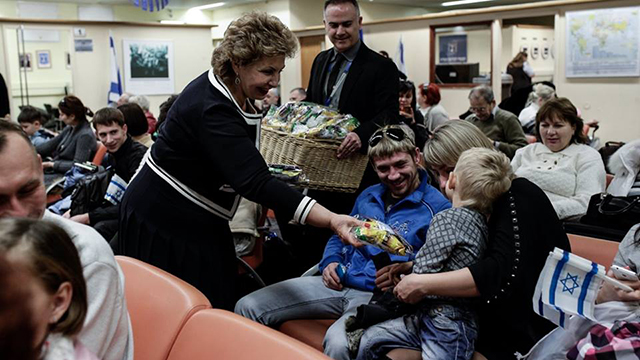
Government approves slimmed-down plan to encourage immigration
Plan to encourage immigration from Belgium, France and Ukraine is approved with much-reduced budget of NIS 180 million, following arguments between Immigration Ministry and Prime Minister's Office.
The government approved on Sunday a plan to encourage immigration from France, Belgium, and Ukraine, following the rise in anti-Semitic attacks in western Europe and the war in Ukraine.
The plan, which includes improvement of the system for absorbing immigrants, will be allocated NIS 180 million – significantly lower than the original sum suggested in an Immigration Ministry proposal. The plan aims to bring about a "significant increase" in the number of immigrants by boosting Hebrew studies, holding immigration fairs, and posting more immigration officials in those countries, according to a government statement.

The plan was designed to bring a large influx of immigrants from the aforementioned countries, and involves the Ministries of Immigrant Absorption, Education, Economy, Welfare and Social Services, Interior, and Health.
Prime Minister Benjamin Netanyahu responded to the recent shootings in Denmark by calling for the "massive immigration" of European Jews to Israel. "This wave of attacks is expected to continue," Netanyahu said at the start of a Cabinet meeting. "Jews deserve security in every country, but we say to our Jewish brothers and sisters, Israel is your home."
But Denmark's chief rabbi, Jair Melchior said he was "disappointed" by Netanyahu's call for immigration following the attack.
"People from Denmark move to Israel because they love Israel, because of Zionism. But not because of terrorism," said Melchior. "If the way we deal with terror is to run somewhere else, we should all run to a deserted island."
“The solution for the Jews of Denmark is not to leave in the wake of the terror attacks in Copenhagen on Saturday,” Denmark's ambassador to Israel, Jesper Vahr, said on Sunday. “Our prime minister said that an attack on the Jewish community is an attack on all of Denmark’s citizens. I echo this sentiment. We will do everything in our power so that the Jewish community in Denmark feels safe.”
A recent ADL poll in Denmark found relatively low levels of anti-Semitic attitudes among the general population. According to the ADL Global 100 Survey, fielded in late 2013 and early 2014, only 9 percent of adults harbor anti-Semitic attitudes in Denmark, the same level as found in the United States and one of the lowest findings in Western Europe.
Budget wars
A bitter confrontation arose between the Ministry of Immigrant Absorption one on side, and the Prime Minister's Office and Finance Ministry on the other, before the plan was proposed. The original emergency plan presented by Minister of Immigration Absorption Sofa Landver included a budget of NIS 1.2 billion over two years.
However, the Justice Ministry rejected the plan, saying it was impossible to present a plan with such a large budget so close to elections. Landver communicated with the PMO over the weekend to negotiate a smaller budget. The PMO initially suggested a two-year plan budgeted at NIS 380 million, but which would provide benefits only to Jews fleeing battle zones in Ukraine and not all Jews from that country.
Associates of Landver said that decision was based on political considerations and that the PMO sees French immigrants, who are considered more loyal to Likud, as more valuable.
Landver successfully convinced the PMO to provide refugee benefits to all Jews from Ukraine (up to NIS 15,000 for each family), which helped dissipate the tension.
The two sides reached an agreement over the weekend. "The Ministry of Immigrant Absorption proposed a more thorough plan," said Landver, "and I thought it would be more appropriate to provide immigrants with adaptation grants as well, and to comprehensively deal with the continuity of immigration.
"Furthermore, I am happy that I managed to include immigrants from France, Ukraine, and Belgium in the decision, in light of the difficult events, and promise that this significant decision is not the last on this issue."
According to statistics from the Ministry of Immigrant Absorption and the Jewish Agency, there has been a large increase in the number of people considering immigrating to Israel, especially Jews in France and Ukraine.
The Jewish Agency's call center in France received 69,000 applicants, 84,000 in 2014, and more than 11,000 in January 2015 alone. Ukraine had 13,000 applicants call in 2013, 15,000 in 2014, and more than 1,300 in January 2015.
Omri Efraim contributed to this report.










